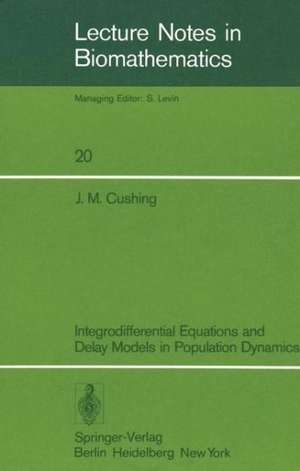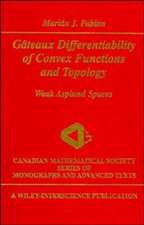Integrodifferential Equations and Delay Models in Population Dynamics: Lecture Notes in Biomathematics, cartea 20
Autor J. M. Cushingen Limba Engleză Paperback – oct 1977
Din seria Lecture Notes in Biomathematics
-
 Preț: 378.54 lei
Preț: 378.54 lei -
 Preț: 380.45 lei
Preț: 380.45 lei -
 Preț: 413.37 lei
Preț: 413.37 lei -
 Preț: 390.63 lei
Preț: 390.63 lei -
 Preț: 396.24 lei
Preț: 396.24 lei -
 Preț: 387.38 lei
Preț: 387.38 lei -
 Preț: 385.08 lei
Preț: 385.08 lei - 5%
 Preț: 366.56 lei
Preț: 366.56 lei -
 Preț: 384.70 lei
Preț: 384.70 lei -
 Preț: 388.13 lei
Preț: 388.13 lei -
 Preț: 394.29 lei
Preț: 394.29 lei - 5%
 Preț: 389.93 lei
Preț: 389.93 lei - 5%
 Preț: 370.74 lei
Preț: 370.74 lei -
 Preț: 387.96 lei
Preț: 387.96 lei -
 Preț: 404.29 lei
Preț: 404.29 lei -
 Preț: 391.61 lei
Preț: 391.61 lei -
 Preț: 384.48 lei
Preț: 384.48 lei -
 Preț: 384.48 lei
Preț: 384.48 lei -
 Preț: 383.71 lei
Preț: 383.71 lei -
 Preț: 379.68 lei
Preț: 379.68 lei -
 Preț: 384.09 lei
Preț: 384.09 lei -
 Preț: 405.66 lei
Preț: 405.66 lei -
 Preț: 379.48 lei
Preț: 379.48 lei -
 Preț: 400.65 lei
Preț: 400.65 lei -
 Preț: 385.25 lei
Preț: 385.25 lei -
 Preț: 390.25 lei
Preț: 390.25 lei -
 Preț: 395.47 lei
Preț: 395.47 lei -
 Preț: 378.71 lei
Preț: 378.71 lei -
 Preț: 382.95 lei
Preț: 382.95 lei - 15%
 Preț: 578.01 lei
Preț: 578.01 lei -
 Preț: 380.84 lei
Preț: 380.84 lei -
 Preț: 405.66 lei
Preț: 405.66 lei -
 Preț: 399.12 lei
Preț: 399.12 lei -
 Preț: 410.66 lei
Preț: 410.66 lei -
 Preț: 385.62 lei
Preț: 385.62 lei - 5%
 Preț: 371.10 lei
Preț: 371.10 lei -
 Preț: 378.71 lei
Preț: 378.71 lei -
 Preț: 386.99 lei
Preț: 386.99 lei -
 Preț: 401.61 lei
Preț: 401.61 lei -
 Preț: 350.30 lei
Preț: 350.30 lei -
 Preț: 383.33 lei
Preț: 383.33 lei -
 Preț: 408.54 lei
Preț: 408.54 lei -
 Preț: 398.53 lei
Preț: 398.53 lei -
 Preț: 399.67 lei
Preț: 399.67 lei -
 Preț: 391.79 lei
Preț: 391.79 lei -
 Preț: 384.86 lei
Preț: 384.86 lei -
 Preț: 401.61 lei
Preț: 401.61 lei -
 Preț: 392.60 lei
Preț: 392.60 lei -
 Preț: 406.05 lei
Preț: 406.05 lei
Preț: 384.86 lei
Nou
Puncte Express: 577
Preț estimativ în valută:
73.65€ • 78.75$ • 61.40£
73.65€ • 78.75$ • 61.40£
Carte tipărită la comandă
Livrare economică 18 aprilie-02 mai
Preluare comenzi: 021 569.72.76
Specificații
ISBN-13: 9783540084495
ISBN-10: 3540084495
Pagini: 208
Ilustrații: VI, 198 p.
Greutate: 0.34 kg
Ediția:Softcover reprint of the original 1st ed. 1977
Editura: Springer Berlin, Heidelberg
Colecția Springer
Seria Lecture Notes in Biomathematics
Locul publicării:Berlin, Heidelberg, Germany
ISBN-10: 3540084495
Pagini: 208
Ilustrații: VI, 198 p.
Greutate: 0.34 kg
Ediția:Softcover reprint of the original 1st ed. 1977
Editura: Springer Berlin, Heidelberg
Colecția Springer
Seria Lecture Notes in Biomathematics
Locul publicării:Berlin, Heidelberg, Germany
Public țintă
ResearchCuprins
1: Introductory Remarks.- 2: Some Preliminary Remarks on Stability.- 2.1 Linearization.- 2.2 Autonomous Linear Systems.- 3: Stability and Delay Models for a Single Species.- 3.1 Delay Logistic Equations.- 3.2 The Logistic Equation with a Constant Time Lag.- 3. 3 Some Other Models.- 3.4 Some General Results.- 3.5 A General Instability Result.- 3.6 The Stabilizing Effect of Delays.- 4: Stability and Multi-Species Interactions with Delays.- 4.1 Volterra’s Predator-Prey Model with Delays.- 4. 2 Predator-Prey Models with Density Terms.- 4.3 Predator-Prey Models with Response Delays to Resource Limitation.- 4.4 Stability and Vegetation-Herbivore-Carnivore Systems.- 4.5 Some Other Delay Predator-Prey Models.- 4.6 The Stabilization of Predator-Prey Interactions.- 4.7 A General Predator-Prey Model.- 4.8 Competition and Mutualism.- 4.9 Stability and Instability of n-Species Models.- 4.10 Delays Can Stabilize an Otherwise Unstable Equilibrium.- 5: Oscillations and Single Species Models with Delays.- 5.1 Single Species Models and Large Delays.- 5.2 Bifurcation of Periodic Solutions of the Delay Logistic.- 5.3 Other Results on Nonconstant Periodic Solutions.- 5.4 Periodically Fluctuating Environments.- 6: Oscillations and Multi-Species Interactions with Delays.- 6.1 A General Bifurcation Theoren.- 6.2 Periodic Oscillations Due to Delays in Predator-Prey Interactions..- 6.3 Numerically Integrated Examples of Predator-Prey Models with Delays.- 6.4 Oscillations and Predator-Prey Models with Delays.- 6.5 Two Species Competition Models with Linear Response Functionals.- 6.6 Two Species Mutualism Models with Linear Response Functionals.- 6.7 Delays in Systems with More than Two Interacting Species.- 6.8 Periodically Fluctuating Environments.- 7: Some Miscellaneous Topics.- References.














